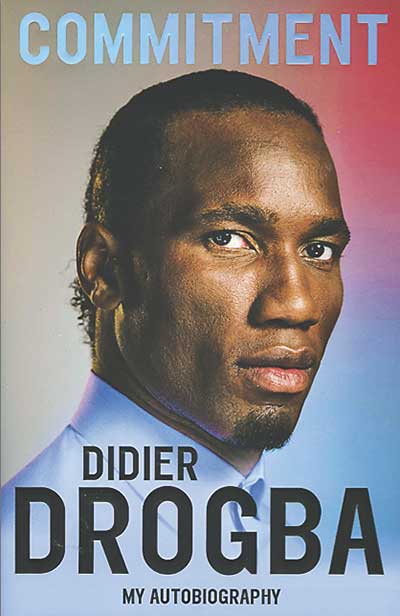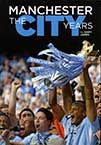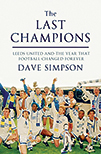Search: ' Nike'
Stories
 My autobiography
My autobiography
by Didier Drogba
Hodder & Stoughton, £20
Reviewed by Si Hawkins
From WSC 348 February 2016
A couple of lines late in Didier Drogba’s autobiography really drive home that this isn’t your average burly striker life story. “On November 2009 I teamed up with Bono to help launch an initiative with Nike on the eve of World Aids Day,” Drogba recalls, before rattling through his UN work, including “mobilising people to eradicate the use of cluster bombs/munitions”. Clearly we’re in a different ballpark to, say, Micky Quinn’s Who Ate All The Pies.
 by Gary James
by Gary James
James Ward, £25
Reviewed by Ian Farrell
From WSC 312 February 2013
Meteoric success in any area, be it sport, show business or politics, is guaranteed to bring a glut of books within six months and sure enough there has been a recent explosion in the number of Manchester City titles on the market. Any new additions to the list are inevitably going to be viewed with ever-increasing cynicism, but Manchester: The City Years can’t de derided as a cash-in. Its author has been writing about the club since before Sergio Agüero was born and this is clearly a book several years in the making. From the first stirrings of organised football in Manchester through to the drama of last May, this is as detailed a history as anyone could conceivably want.
Season by season, over the course of 600 pages, City’s up and downs are brought to life through a truly staggering level of research. Add in several hundred photographs, press clippings, newspaper cartoons, programme covers and cigarette cards and it’s difficult to pinpoint anything more that could have been done to chronicle the club’s successes, failures, or even the relatively uneventful bits in between.
There is also plenty of opinion and spin to go with the facts and figures. This is a book written by a hardcore fan rather than an impartial historian and Gary James never misses an opportunity to defend the club, criticise its critics and highlight any occasions where he feels they’ve been the victim of unfair treatment or media bias. He is particularly sensitive to any negative reaction to the new order of the last five years and any fans nostalgic for the old ways might feel uncomfortable with the blanket praise he has for the current regime.
Readers of more delicate sensibilities might also blanch at the glowing portrayal of former CEO Garry Cook, the ex-Nike executive notorious for conducting interviews with all the dignified humility of Don King. Cook left his position after he accidentally sent a mocking email to Nedum Onuoha’s cancer-stricken mother, something he initially denied by claiming his account had been hacked by someone out to frame him. Here, he receives the very lightest admonishment for his actions, with the media subject to considerably greater scrutiny for the manner of its reporting of the story.
But whether you buy into the author’s worldview or not, Manchester: The City Years is a hugely impressive piece of work. Whatever your view of Manchester City, whether you’ve always liked them, always disliked them or have switched your opinion in recent times, it would be difficult to deny that they’re one of English football’s most interesting institutions and James may well have produced the definitive account of their story.
 Leeds United and the year that football changed forever
Leeds United and the year that football changed forever
by Dave Simpson
Bantam Press, £16.99
Reviewed by Simon Creasey
From WSC 305 July 2012
Twenty years ago a ragtag bunch of journeymen footballers, raw youngsters, non-League players plucked from obscurity and a mercurial Frenchman achieved the seemingly impossible. Assembled for just £8 million, the 1991-92 Leeds United team created by Howard Wilkinson became the last side to win the old Division One title. The following season the Premier League was born.
What this team achieved in a short space of time was unprecedented. In just three and a half seasons, following almost a decade in the wilderness, Wilkinson transformed a relegation-threatened second-level side into League winners. The sheer size of the achievement has finally been given the recognition it deserves in The Last Champions.
Author Dave Simpson tracked down members of the title-winning side to find out what it was like in the inner sanctum of the club during this momentous period. Featuring interviews with former players including Lee Chapman, Tony Dorigo and a touching chat with Gary Speed shortly before his untimely death, Simpson pieces together what made this team such a cohesive, well oiled machine.
The book starts by revealing that Wilkinson pioneered many of the sports science techniques common in today’s game. From the dietary advice and special vitamin drinks he prescribed, through to the extreme, military-style fitness regime that earned him the “Sergeant” moniker, Wilkinson was acutely aware that physical conditioning could make up for a shortfall in technical ability.
It also charts Wilkinson’s sometimes suspect man-management skills and his ability to cut players loose without seeming to give any thought to their feelings. Among many others, Vinnie Jones and Chris Kamara were ruthlessly released when Wilkinson decided they had served their purpose by helping the club return to the top flight.
The interviewees provide plenty of eye-opening stories about former team-mates. While Simpson failed to make contact with the reclusive David Batty, who turned his back on the game after retiring, there are plenty of colourful anecdotes about the midfielder. Such as the time an inebriated Jones took his car for a spin – with some “birds” in tow – around Batty’s front lawn before breaking into the house to frighten his team-mate, only to find Batty wielding a Bowie knife that he hid in his bed.
Amid the usual revelations that are common to all contemporary football biographies, Simpson’s story captures the pathos of the many players who narrowly missed out on the Premier League cash cow. While some leading lights from the squad forged lucrative post-retirement careers, such as Eric Cantona, Jones and Kamara, many of the title winners are still holding down ordinary jobs to pay the bills. Former striker Carl Shutt works as a travel agent and towering centre-half John McClelland provides regular tours of Elland Road when not working as a postman. McClelland best sums up the sheer magnitude of the team’s achievement, which he likens to “climbing Everest”. To put it into context, imagine Southampton winning the Premier League title in 2013-14. That is what Wilkinson and his players achieved and it is what makes this story so special and worthy of Simpson’s insightful homage.
 Manchester City’s recently departed chief executive was offensive and distasteful, but he was also good at his job, as Tony Curran reports
Manchester City’s recently departed chief executive was offensive and distasteful, but he was also good at his job, as Tony Curran reports
During his time as chief executive of Manchester City, Garry Cook developed a reputation for making public faux pas. So it was not surprise when this propensity brought him down. Cook, should we need reminding, sent an email that he believed was exclusively directed to colleague Brian Marwood in which he mocked the cancer diagnosis of Dr Anthonia Onuoha, the mother and agent of City player Nedum.